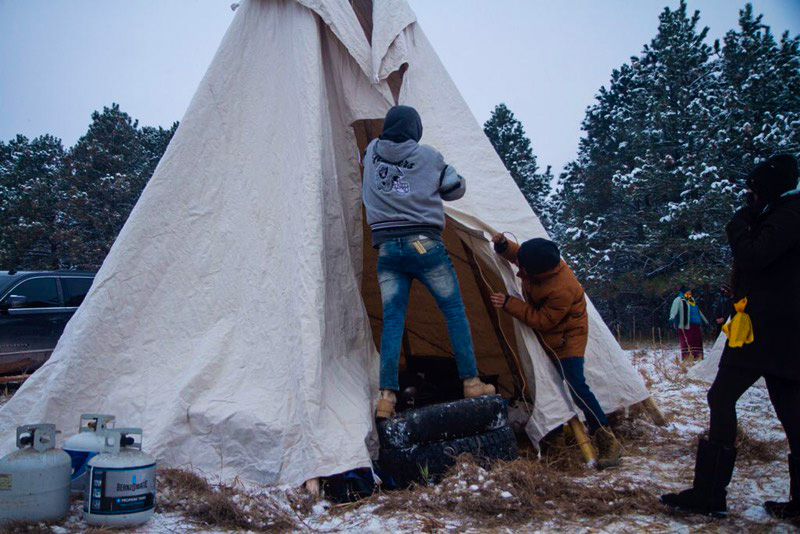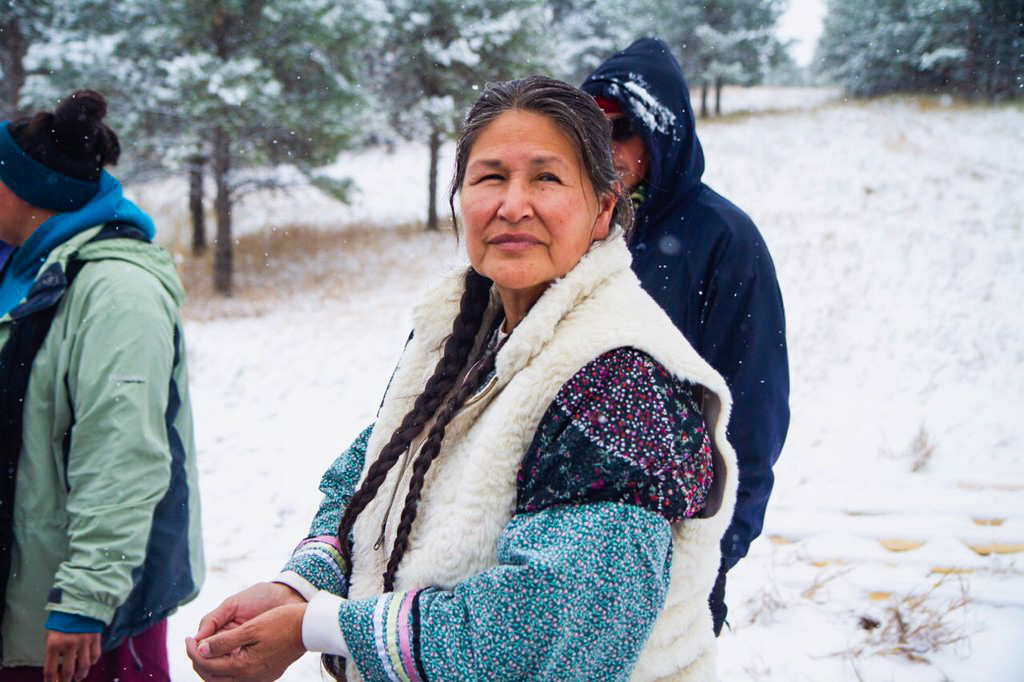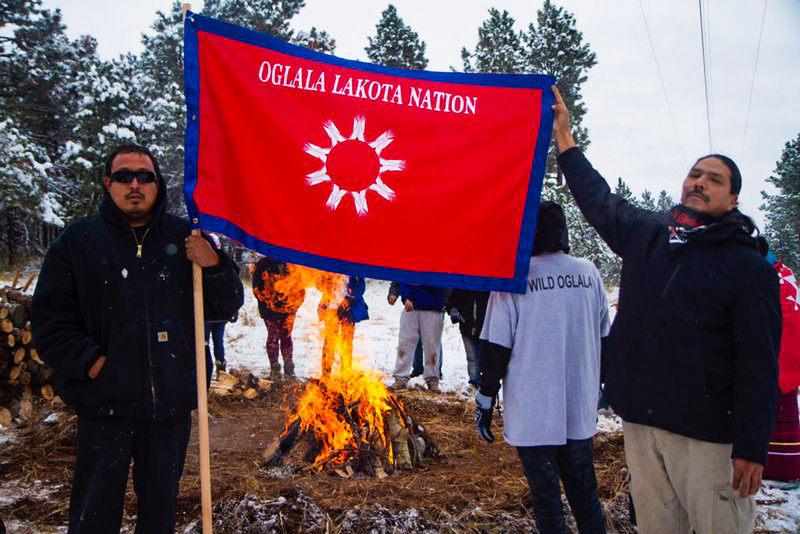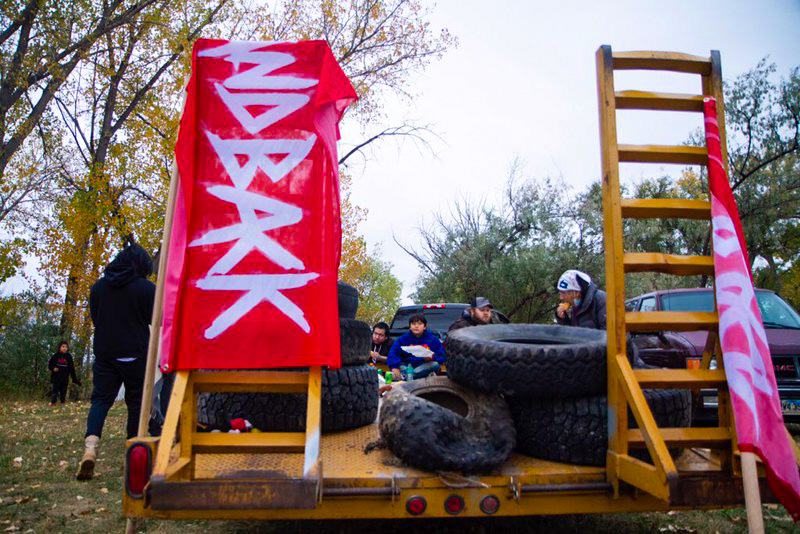Indianz.Com >
News > Native volunteers set up tipi camp to help address homelessness
A meal service at Camp Mni Luzahan, a tipi encampment located on tribally-owned trust land in the Black Hills of South Dakota. Photo © Independent Media Project
Native volunteers set up tipi camp to help address homelessness
‘There is violent, vitriolic hatred of homeless people going on’
Thursday, October 22, 2020
Indianz.Com
•
Support Camp Mni Luzahan
Along a meandering creek at the foot of the Black Hills, a decision by a group of Native activists last week to set up a small tipi encampment has brought them into conflict with local officials but has also brought attention to the plight of hundreds of homeless Native men and women in Rapid City, South Dakota.
The
Mni Luzahan Patrol – a coalition of Native volunteers that formed to protect homeless Native people living along Rapid Creek – set up the tipi camp last Friday.
James Pipe On Head, a 25-year-old Oglala Lakota man, said the group decided to set up the tipis because they decided it was the most effective way to ensure the safety and well-being of the city’s homeless population. According to an October 17 article by South Dakota Public Broadcasting, seven homeless people in Rapid City have died from exposure in the last five years.
Pipe On Head said the group tried to work with city officials to create a shelter for homeless Native people but failed to come to a consensus.
“The city is always saying ‘we do want to help,’” he said. “Then they don’t end up doing anything about it.”
Workers set up tipis at Camp Mni Luzahan, located on tribally-owned trust land in the Black Hills of South Dakota. Photo © Independent Media Project
Not long after setting up the tipis last Friday, Rapid City police moved into the park and began forcing the volunteers to take down the tipis. While the volunteers took down three of the tipis, several people inside the fourth tipi refused to leave.
Police cited several volunteers with obstruction and resisting arrest
The next day,
Mayor Steve Allender held a press conference to answer questions about the city’s decision to take down the tipi camp. More than a dozen Native activists and a freelance journalist arrived at the city building to attend the press conference but were refused entry by Allender and Police Chief Don Hedrick.
The activists attempted to follow a television news reporter into the building but were stopped at the door by Allender and Hedrick. One activist, Mark Tilsen Jr., held the door open and began arguing with the mayor and police chief.
“This is for the press,” Allender said, while trying to close the door. “You’re not invited. We’re not turning this into a circus.”
But Tilsen refused to let go of the door.
“This is a public building,” one Native man said.
Raid City mayor closed the press conference to our local corespondent saying she’s not a real journalist. He physically pushes a member of Mni Luzahan Creek Patrol stating he doesn’t want a circus inside.
Posted by Chynna Lockett on Saturday, October 17, 2020
A video shared by Chynna Lockett shows the incident in which Mayor Steve Allender of Rapid City, South Dakota, pushed Mark Tilsen away from the door of city hall after refusing to allow members of the Indian community inside on October 16, 2020.
At one point, Allender reached over and pushed Tilsen, who continued holding the door open.
“That’s assault right there,” one Native man said.
Eventually, Tilsen let the door close, and the activists walked away from the city building.
After learning of the city tearing down the tipis and not allowing Native activists into the press conference, a group of three tribes — the Cheyenne River, Rosebud and Oglala Sioux tribes — that owns trust land just outside the Rapid City city limits decided to donate the land to be used as a tipi encampment for homeless Native men and women.
Tilsen said the Mni Luzahan Patrol has set up four tipis at the encampment, as well as port-a-potties and handwashing stations. They have also begun setting up supply tents and are seeking an Army tent to use as a cook shack.
The encampment will serve as a shelter for homeless people who otherwise might be living along Rapid Creek, Tilsen said.
“We’re basically trying to meet a need that the city has a lot of difficulty with,” he said.
At Camp Mni Luzahan, in the Black Hills of South Dakota. Photo © Independent Media Project
He said in 2018 local church organizations attempted to help homeless Native people living along Rapid Creek, including feeding and housing them, but police threatened those organizations saying they wouldn’t respond to calls for service if they had homeless people living there.
Within a week, homeless people began freezing to death, Tilsen said.
“The city wants them simply to go away, back to where they came from,” he said.
Indeed, at
Saturday’s press conference, Mayor Allender reiterated an earlier statement he had made that the Oglala Sioux Tribe should take its homeless citizens back to the Pine Ridge Reservation.
He said the city had identified 18 newly arrived homeless people from the reservation and offered to provide transportation to them to go back. Allender said a Lakota elder had recommended the city help them return home, where they would have a support network to help them.
But some Native activist described his demand as an attempt at “forced relocation of Indians,” he said.
“This is just another case of damned if you do, damned if you don’t,” he said.
The Oglala Lakota Nation flag is seen at Camp Mni Luzahan, a tipi encampment located on land held in trust for the Oglala Sioux Tribe, the Cheyenne River Sioux Tribe and the Rosebud Sioux Tribe. Photo © Independent Media Project
Responding to the mayor’s demand, Tilsen said the Pine Ridge Reservation doesn’t have the resources to deal with its own homeless population as it suffers from a housing deficit of 5,000 housing units. While few homeless people can be seen on the reservation, the reason for that is because people live in crowded homes and when there’s no more room in a home they find other places to live.
“If there’s literally no room for anybody, people live in cars,” he said.
He said the mayor’s demand that Native homeless people from the reservation return home is neglecting the fact that those people also are citizens of South Dakota and the United States.
“It’s akin to saying, ‘These people are not part of our community. We do not need to take care of them,’” he said.
Some Native leaders have called for the city to create a wet shelter for the homeless, a place where homeless people who are intoxicated can sleep at night. Tilsen said the mayor has rejected that idea, and he blamed his reluctance on bias against intoxicated homeless people.
He said society doesn’t seem to mind alcoholics who work every day or its reliance on revenue generated by the sale of alcohol to heavy drinkers. The Sturgis Motorcycle Rally in August generated enormous tax revenue through alcohol sales, which accounted for nearly half the revenue generated by the rally, Tilsen said.
“We don’t have a problem with alcoholics, except when it comes to the homeless,” he said.
He said Rapid City has become a dangerous place for people living on its streets.
Homeless people have been attacked and nearly run over while sleeping, Tilsen said. He described an incident near the Journey Museum where a group of homeless people had set up a camp. One night, three vehicles drove into the camp and nearly ran over people living in tents.
And just last week, a drunk driver nearly killed people camping in Roosevelt Park, he said.
“There is violent, vitriolic hatred of homeless people going on,” Tilsen said.
“I reached out and touched him on the chest and pushed him backwards, slowly”: Mayor Steve Allender of Rapid City, South Dakota, admitting putting his hands on Mark Tilsen after members of the Indian community asked to be included in a press conference at city hall on October 16, 2020. Source: NewsCenter1 [At 17:11 in the video]
In
September, Allender claimed there were as many as 100 new homeless people living in Rapid City.
A survey by the South Dakota Housing for the Homeless Consortium in January found 353 homeless people living in the city. That’s compared to 322 homeless people in the city around the same time in January 2019, a nearly 9 percent increase in one year.
The mayor has blamed free food provided by charitable organizations to homeless people as one reason for the
influx of new homeless people to the city.
But Tilsen said many of the newly homeless people in Rapid City are people who have lost their homes because of evictions and losing their jobs due to the impact of the COVID-19 impact on their employers.
#LANDBACK. Photo © Independent Media Project
According to data the Pennington County Sheriff’s Office, as many as 80 people have been evicted from their homes since May. Tilsen said many landlords have failed to abide by federal guidelines that prohibit evictions of tenants who have been impacted by COVID-19.
“There are a lot of folks that are homeless because they were thrown out of the homes that they had,” he said.
Tilsen said the mayor’s efforts to stop charitable organizations, including churches, from feeding and housing the homeless in Rapid City have placed him at odds with many in the community who have philanthropic intentions and live according to a Christian ethos that drives them to help the less fortunate.
“Somehow the mayor is in discord with that,” he said.
He said the mayor, who is a former police officer, has often failed to remember his new position requires him to find solutions rather than serve only as a legal enforcer. He said that may be why the mayor decided to take action last week and push him out away from the door to the public building where he was holding the press conference, instead of waiting for police to do it for him.
“He does not have the right to lay hands on his citizens,” Tilsen said. “He’s no longer a cop.”
Related Stories
Elizabeth Cook-Lynn: The problem with Rapid City’s mayor (October 21, 2020)
Tim Giago: Rapid City Mayor refers to Natives as “Those People” (October 5, 2020)
Native Sun News Today: Activists seek ‘command center’ for tribal community (September 22, 2020)




